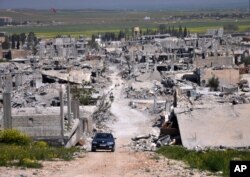The Islamic State group launched an offensive on the Kurdish-held Syrian border city of Kobani, one of three major rebel assaults reported across the country Thursday.
After recent losses to Kurdish forces, which are supported by U.S.-led coalition airstrikes, the Islamic State group sought to retake the inititative with attacks on the Kurdish-held town of Kobani and government-held areas of Hasaka city in the northeast.
The attack began with a suicide bombing early Thursday near Kobani's border crossing with Turkey, according to the Syrian Observatory for Human Rights, which says dozens have been killed or wounded in the fighting.
The British-based organization later said Islamic State fighters executed at least 20 Kurdish civilians, including women and children, in the town of Barkh Butan, just south of Kobani.
Kurdish fighters, with the help of U.S.-led airstrikes, took control of Kobani in January following months of clashes with Islamic State forces. It was seen as an important, symbolic victory in the fight against the Islamic State group.
Also Thursday, the Observatory reported Islamic State forces seized two neighborhoods from government forces in Hasaka. Syrian military sources denied the report and said government forces repelled the jihadist attack, according to Reuters.
Control of Hasaka is divided between Kurdish and Syrian government forces. The city has come under repeated attack from the Islamic State militants.
Government-held parts of Hasaka are one of President Bashar al-Assad's last footholds in the northeast region bordering Iraq and Turkey.
Southern Front
Meanwhile, a coalition of rebels known as the Southern Front alliance attacked government positions Thursday in the southern city of Daraa in what appears to be a long-promised offensive.
The Observatory reported heavy clashes and artillery fire in Daraa, where the uprising against President Bashar al-Assad began in 2011.
The official Syrian Arab News Agency confirmed the fighting, saying six people were killed and 13 wounded.
There were no other immediate reports on the success of the offensive by the Southern Front, which is composed of 54 rebel groups and has for months promised to carry out a so-called "Southern Storm" assault in the area.
The alliance includes fighters from the mostly defunct Free Syrian Army, who have been trained and armed by the United States and its allies. But the coalition, which also includes Islamist groups, has struggled to gain full backing from the West.
If Daraa falls, it would be the third provincial capital lost by Assad in the four-year-long war, after Islamic State-held Raqqa and Idlib, which is held by another rebel alliance.
The Islamic State attacks Thursday follow two weeks that saw Kurdish forces advance deep into the Islamist group's territory, to within 50 kilometers (30 miles) of its de facto capital Raqqa.
While the latest Kurdish advances in Syria have shifted momentum against the jihadists, Islamic State fighters have adopted a tactic of advancing elsewhere when they lose ground.
Fighting in Syria has killed more than 220,000 people since the conflict there began in March 2011.
Some material for this report came from Reuters and AP.






